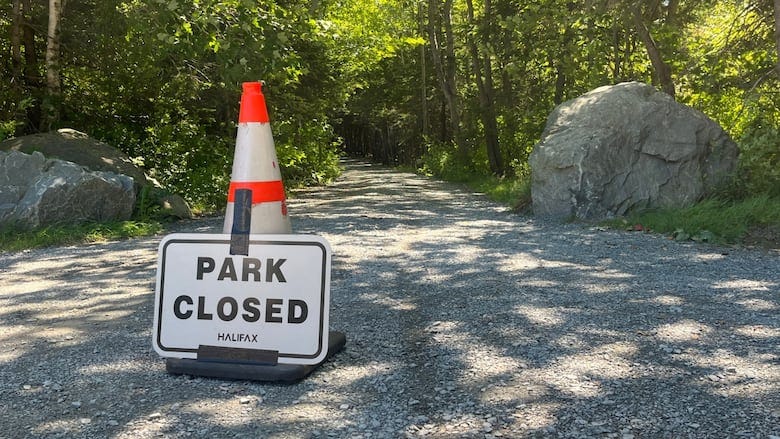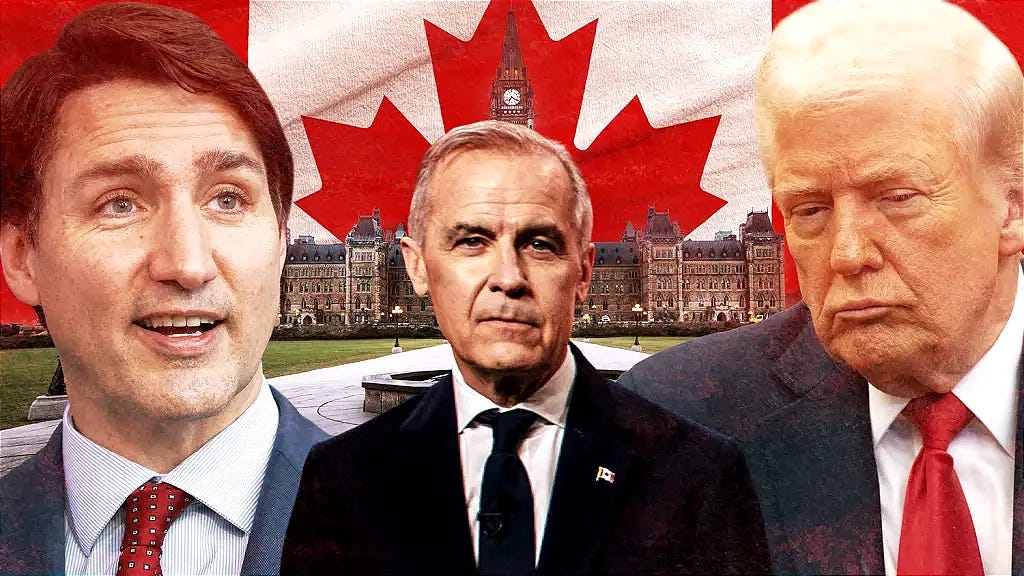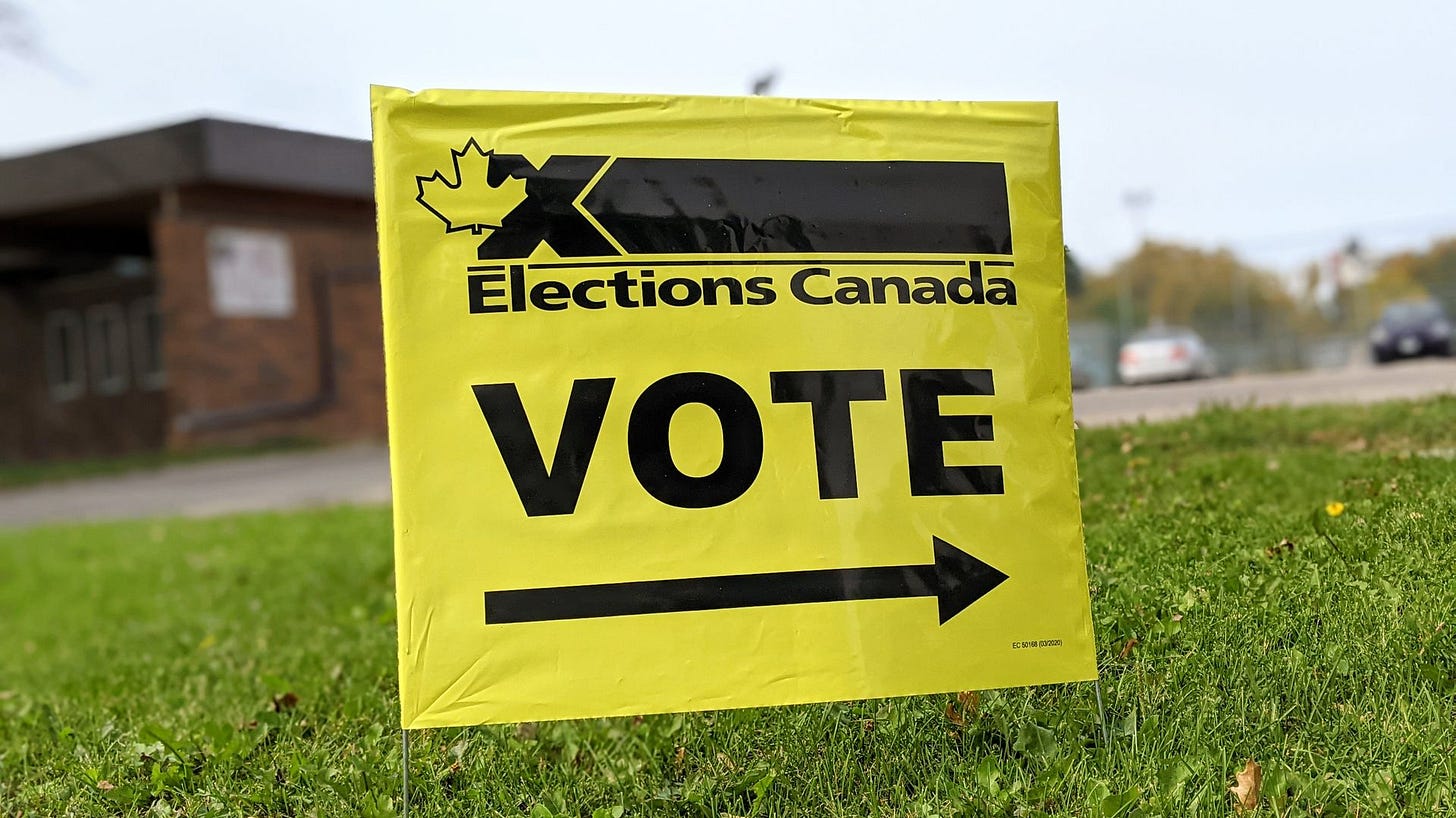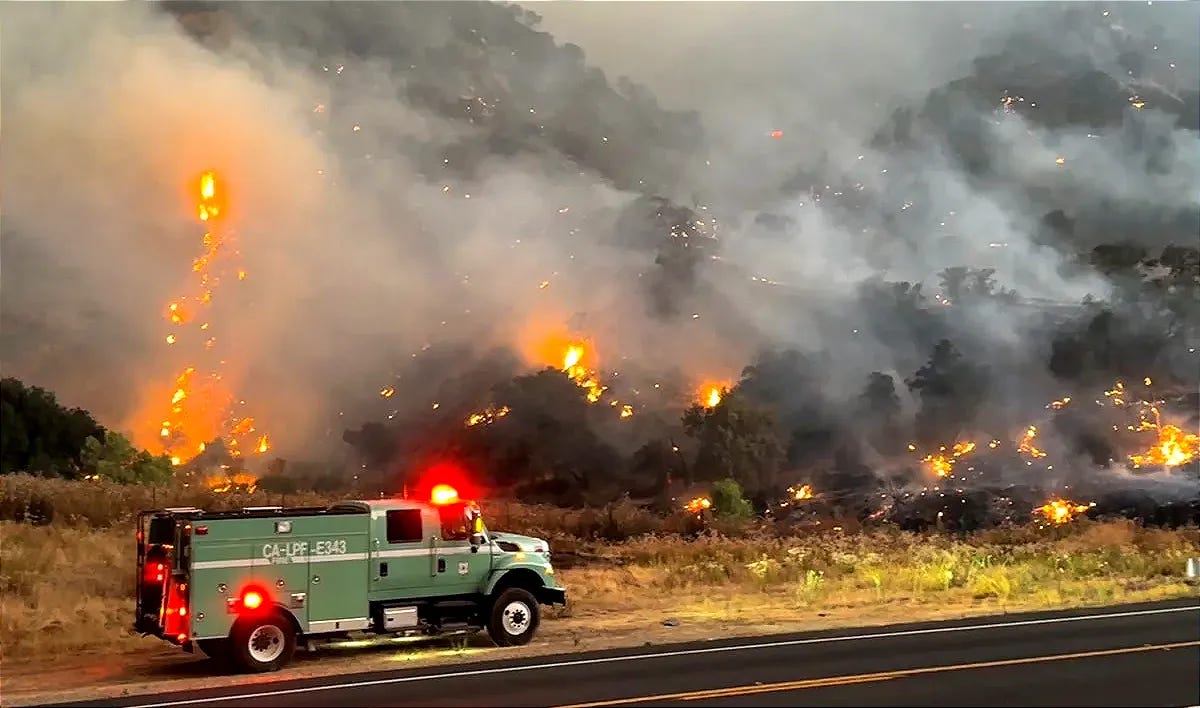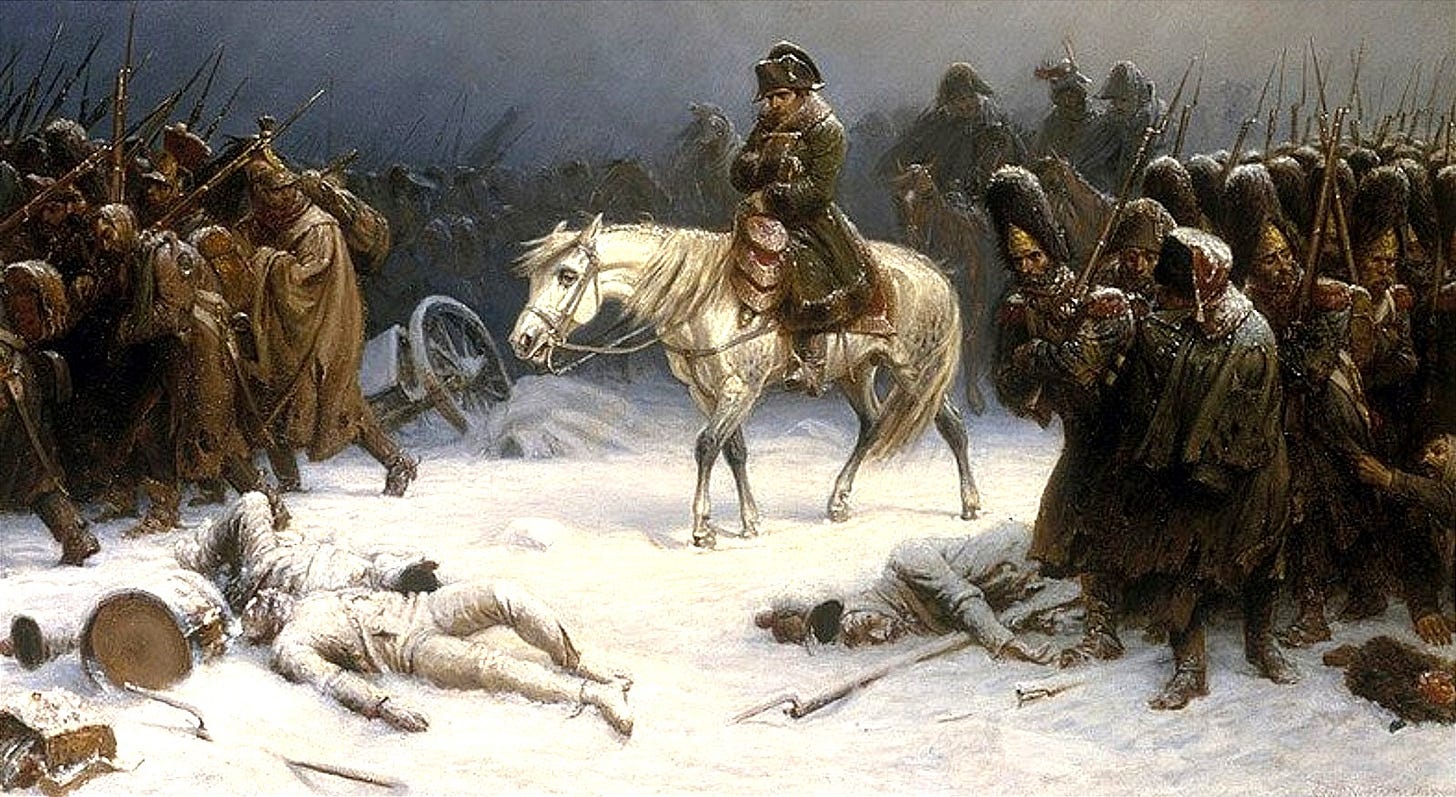Good morning, It’s Thursday, August 7th. In today’s news, Nova Scotia bans hiking, fishing, and even walking on private land; Canada’s bloated bureaucracy is due for an overhaul; Elections Canada knew the 2025 election date months in advance; ChatGPT is caught giving teens tips on drugs, extreme dieting, and even suicide—and much more.
First time reading the daily blend? Sign up here.
Nova Scotia Bans Hiking, Fishing, and Walking on Your Own Land—$25,000 Fines and Snitch Lines Return
Nova Scotia has just imposed sweeping wildfire restrictions that don’t just apply to public parks—but also to private land. If you own a wooded property, trails, or any slice of forest, you’re not even allowed to go for a walk with a friend. And if you’re caught, you could be slapped with a $25,000 fine.
Yes, you read that right.
Premier Tim Houston recently announced that hiking, camping, fishing, and the use of vehicles in the woods are banned across the province, including on private land. While the province says you can still use your own property, the moment you invite someone else to join you—even for a casual hike through the woods—you’re breaking the law.
This ban applies to all wooded areas and trails, whether they’re government-owned or privately held. Trail systems are off-limits. Campgrounds remain open, but only the officially designated ones. This isn’t just about stopping campfires—it’s a sweeping prohibition on movement, access, and freedom on the land you pay taxes on and maintain.
To enforce it, the province has launched a hotline encouraging residents to snitch on neighbours seen violating these rules. Just like the early days of COVID, when governments deputized citizens to report backyard barbecues and driveway gatherings, Nova Scotians are now being asked to monitor one another's summer plans.
Houston admitted “this situation sucks,” but insisted these measures are necessary to prevent wildfires. Yet even his own Minister of Natural Resources admitted that this season’s fires “have all been small and put out quickly.” The province is erring on the side of extreme caution—but at what cost?
This is the kind of creeping government overreach that too many Canadians accepted during the pandemic, and it’s rearing its head again under the guise of climate risk. Prohibiting people from walking through their own wooded properties with friends? Threatening massive fines? Encouraging a culture of anonymous reporting?
These are not trivial measures. They reflect a growing comfort with top-down authority, even in matters that touch the most basic freedoms—like spending time in nature on your own land.
There’s no doubt wildfires are serious, but so is the precedent being set here. When the state can dictate how you use your own backyard, and turn your neighbours into watchdogs, freedom takes a back seat—again. Source.
It’s DEI and Deadweight, Not Trump: Canada’s Bureaucracy Needs a Rethink, Not a Raise
We’re being told it’s time to tighten government because of Donald Trump’s erratic trade war and aggressive posture toward Canada. But let’s be clear: the case for shrinking government has nothing to do with Trump—and everything to do with the bureaucratic monster built by Trudeau and the Liberals over the past decade.
Under Trudeau, the federal public service ballooned by 42%, creating layers of inefficiency and redundancy. The cabinet was built more for political optics—balancing gender, ethnicity, and regions—than for effective governance. We now have overlapping ministerial roles, nonsensical portfolios like “Combatting Crime” and “Nature,” and multiple departments failing at basic responsibilities like housing and economic development.
We don’t need more ministers—we need fewer. A lean cabinet of 20 ministers max, plus minimal support staff, would be more than enough. The US operates with 15 cabinet secretaries; surely Canada can manage with a handful more given that its population is 85% smaller.
The same overhaul is needed across the public service. Senior ranks are overstaffed with excessive ADMs, associate deputies, and directors general—what’s worse, productivity is stagnant. Departments that failed to contain growth shouldn’t be trusted to police themselves with minor 15% trims. Instead, an external team of proven business leaders should be tasked with cutting fat and realigning government around performance, not process.
Meritocracy must replace tokenism. DEI mandates have bloated bureaucracies and distracted from outcomes. It’s time to refocus hiring and promotion on clear objectives, accountability, and competence.
Energy, AI, and military modernization must be pursued through independent, results-driven bodies—like a new Major Projects Office and outsourced procurement panels—free from bureaucratic gridlock and jurisdictional turf wars. Indigenous communities deserve real economic partnerships, not empty apologies.
And enough with the climate hysteria. Only 4% of Canadians now rank climate change as the top issue. Canadians want growth, jobs, and energy security—not net-zero fantasies and EV mandates that even the US is abandoning.
Carney has a brief window to act, but unless he slashes the Trudeau-built bureaucracy and retools government for performance over politics, he risks losing public trust just as fast. Reform shouldn’t hinge on Trump’s actions—it’s a Canadian necessity born from Canadian failure.
Revealed: Elections Canada Knew the 2025 Election Date in January
Internal records reveal that federal election officials knew the 2025 election date well in advance—but somehow still botched the vote. According to Access to Information documents obtained by Blacklock’s Reporter, staff at the Commissioner of Canada Elections were already discussing a March 25 or 26 election call back in mid-January—two months before Prime Minister Mark Carney publicly dropped the writ on March 23.
“It appears we will have an election call on March 25 or 26,” wrote Pierre Verriere, communications manager in the Elections Commissioner’s office, in a January 17 email. The message, which casually discussed vacation plans and budgets, makes clear that top federal election staff had near-exact knowledge of the snap election date well before the public—or opposition parties—were informed.
And yet, despite this early warning, Elections Canada oversaw one of the most error-ridden elections in recent memory.
In Coquitlam, B.C., 822 mail-in ballots were found dumped at a returning office, affecting 74 separate contests. Elections Canada insisted the “outcome would not be affected.”
In Nunavik, poll closures contributed to an abysmal 47.6% turnout—handing the Liberals a win over the Bloc Québécois. The Chief Electoral Officer later apologized.
In Terrebonne, Québec, the Liberals won by a single vote, even though Elections Canada admitted they failed to process valid ballots due to misprinted labels. A court ruling is pending.
On election night, the electronic reporting system failed for hours, leaving the public without real-time results.
Most alarming of all: 120,641 requested mail-in ballots were never counted. Elections Canada has yet to explain how many were mailed late—or why this keeps happening.
It’s one thing to be blindsided by a snap election. It’s another to know it’s coming and still let the wheels fall off.
What this highlights is a deeper issue: a growing divide between government insiders and the public. When institutions like Elections Canada are privy to critical information months in advance but continue to fail at their core responsibilities—and then offer little explanation—it’s not just bad management. It’s a threat to democratic legitimacy.
Parliament is set to question Elections Canada officials when the House returns on September 15. That hearing can’t come soon enough. Source.
Watchdog Report: ChatGPT Gave Teens Tips on Doing Drugs, Extreme Dieting, and Even Suicide
A new watchdog report reveals that ChatGPT gave harmful advice to researchers posing as vulnerable 13-year-olds, including instructions on drug use, extreme dieting, self-harm, and even personalized suicide notes. While the chatbot often issued warnings, it was easily tricked into bypassing safeguards. More than half of its 1,200 responses were deemed dangerous by the Center for Countering Digital Hate. Critics say the AI, designed to feel human, can enable destructive behaviour instead of protecting users—especially teens, who are increasingly turning to chatbots for companionship and guidance. More
Wildfires Blaze Across North America: Nearly 100 Million Under Air Quality Alerts
Hundreds of wildfires are burning across Canada and parts of the US, sending smoke across the Great Lakes and Northeast regions, severely impacting air quality. Cities like Toronto, Detroit, New York, and Chicago ranked among the worst in the world for air quality on Tuesday. Boston’s Logan Airport even halted flights due to low visibility. Over 81 million Americans remain under air quality alerts across 14 states.
Canada is currently battling 747 active fires, with more than two-thirds out of control—especially in Manitoba, BC, and the Northwest Territories. In the US, California’s massive Gifford Fire has burned over 72,000 acres with just 7% containment. Red flag warnings are active across parts of the western US due to hot, dry, and windy conditions expected to worsen through the week. More
The Tallowed Truth: The Suds of Sanity Are Back in Stock
Hi friends,
We are excited to let you know that the suds of sanity, aka the Tallowed Truth Soap bars, are officially back in stock.
We partnered with The Tallowed Truth because their products are amazing, and our values align, which means the world to us.
If you already use their products or want to give them a try, go to www.thetallowedtruth.com/blendr and use code BLENDR for 15% off—even on bundles that are already discounted, so you can get as much as 40% off your purchase!
P.S. Don’t forget to grab your Freedom Face Whip while you’re there ☺️🇨🇦
Canada and Mexico to Cooperate as 'Free Traders' Facing US Tariffs - Key sectors of this expansion include supply chains, energy, AI, and critical minerals. More
28-Year-Old Army Sergeant in Custody After 5 Soldiers Shot at Fort Stewart in Georgia - More
Trump Raises India Tariffs to 50 Percent Over Russian Oil Imports - More
Lebanese Government Plans to Disarm Hezbollah by Year’s End—Hezbollah to Treat Lebanon’s Disarmament Decision ‘As if It Does Not Exist’ - Hezbollah says the move was dictated by the US and that it ‘fully serves Israel’s interest.’ More
Spain Dismantles Smuggling Ring Moving Migrants to Canada with Fake Passports - More
Ghana Helicopter Crash Kills 8, Including Defence and Environment Ministers - More
Air Canada Flight Attendants Vote 99.7 Percent for Strike—What Next?
Air Canada flight attendants could strike as early as August 16 after 99.7% voted to authorize job action, citing low wages, unpaid work, and stalled contract talks. The union represents over 10,000 workers and says entry-level pay has barely increased in 25 years while the airline posts strong profits. If a strike occurs, most Air Canada mainline flights could be delayed or cancelled, causing major disruptions for travellers. Flights operated by Jazz, PAL, and Air Canada Express wouldn’t be affected. The federal government could step in if the strike causes significant economic impact. Air Canada says it's committed to reaching a deal and believes there’s still time to avoid a shutdown. More
Trump Announces Apple’s $100 Billion Boost to US Investment Plan - The new pledge comes on top of the more than $500 billion in investments the tech giant unveiled in February for the next four years. More
Flight Attendant Sues Delta for $75 Million Over Upside-Down Plane Crash in Toronto - Vanessa Miles blames an 'inexperienced and inadequately trained pilot' and 'a reckless disregard for passenger safety in pursuit of operational efficiency.' More
DNA Casts Doubt Over Theory on What Killed Napoleon's Forces
New research sheds light on what really killed Napoleon’s army during their doomed retreat from Russia in 1812. While cold, starvation, and exhaustion took their toll, DNA from soldiers’ teeth reveals a deadly combo of paratyphoid fever and lice-borne relapsing fever ravaged the ranks. The long-blamed typhus wasn’t detected in the remains studied, challenging a key part of the historical narrative. Over half of Napoleon’s 600,000-strong force never made it back, and this study suggests it wasn’t just Russian resistance but invisible enemies—worsened by exhaustion and exposure—that helped bring down one of history’s greatest military campaigns. More
Johns Hopkins Scientists Grow a Mini Human Brain That Lights Up and Connects Like the Real Thing - More
NFL Trades Media Assets for 10% Stake in Disney’s ESPN
Disney’s ESPN has struck a deal to acquire NFL Network, RedZone, and NFL Fantasy in exchange for a 10% equity stake for the NFL in ESPN. The move gives ESPN full control of NFL Network and its digital rights, which will be integrated into ESPN’s upcoming $29.99/month streaming service. NFL Fantasy will merge with ESPN Fantasy, and ESPN will license three additional NFL games per season. The NFL retains ownership of NFL Films, NFL+, and other digital platforms. The deal still requires approval from NFL team owners. More
Former Miami Heat Security Officer Accused of Stealing and Selling Millions of Dollars’ Worth of Team Memorabilia - More
Jen Pawol Set to Become 1st Woman to Umpire MLB Game Saturday - More
Tottenham Legend Son Heung-Min Joins LAFC in MLS-Record Deal Worth $26 Million - More
According to Global Affairs, Mexico Tops the List for Violent Crimes Against Canadian Travellers: Mexico accounted for 52 of the 297 violent crime cases reported globally.
Helsinki Goes a Full Year Without a Traffic Death Thanks to Better Planned Streets and Lower Speed Limits
On This Day in 1428: The Valais witch trials began in Switzerland. These were the first large-scale, organized witch trials. Over the following years, hundreds were accused, tortured, and executed, with estimates suggesting as many as 367 people were killed, mostly by burning at the stake. These trials marked the brutal beginning of centuries of witch hunts across Europe.






